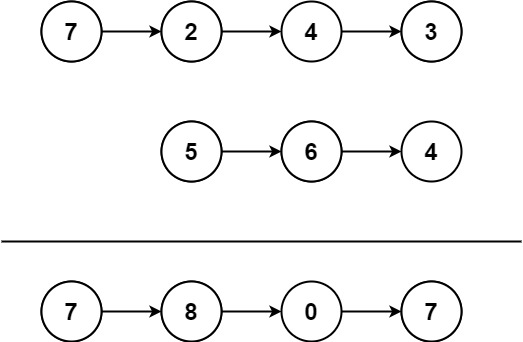Description
You are given two non-empty linked lists representing two non-negative integers. The most significant digit comes first and each of their nodes contains a single digit. Add the two numbers and return the sum as a linked list.
You may assume the two numbers do not contain any leading zero, except the number 0 itself.
Example 1:

Input: l1 = [7,2,4,3], l2 = [5,6,4] Output: [7,8,0,7]
Example 2:
Input: l1 = [2,4,3], l2 = [5,6,4] Output: [8,0,7]
Example 3:
Input: l1 = [0], l2 = [0] Output: [0]
Constraints:
- The number of nodes in each linked list is in the range
[1, 100]. 0 <= Node.val <= 9- It is guaranteed that the list represents a number that does not have leading zeros.
Follow up: Could you solve it without reversing the input lists?
Code
Time Complexity: , Space Complexity:
結合 Reverse Linked List 和 Add Two Numbers 就可以解出。
/**
* Definition for singly-linked list.
* struct ListNode {
* int val;
* ListNode *next;
* ListNode() : val(0), next(nullptr) {}
* ListNode(int x) : val(x), next(nullptr) {}
* ListNode(int x, ListNode *next) : val(x), next(next) {}
* };
*/
class Solution {
public:
ListNode* addTwoNumbers(ListNode* l1, ListNode* l2) {
l1 = reverse_list(l1);
l2 = reverse_list(l2);
int carry = 0;
ListNode* dummy = new ListNode(0);
ListNode* curr = dummy;
while(l1 || l2 || carry) {
int sum = 0;
if(l1) {
sum += l1->val;
l1 = l1->next;
}
if(l2) {
sum += l2->val;
l2 = l2->next;
}
sum += carry;
curr->next = new ListNode(sum % 10);
carry = sum / 10;
curr = curr->next;
}
ListNode* res = reverse_list(dummy->next);
return res;
}
ListNode* reverse_list(ListNode* head) {
ListNode* prev = nullptr;
ListNode* cur = head;
while(cur) {
ListNode* next = cur->next;
cur->next = prev;
prev = cur;
cur = next;
}
return prev;
}
};